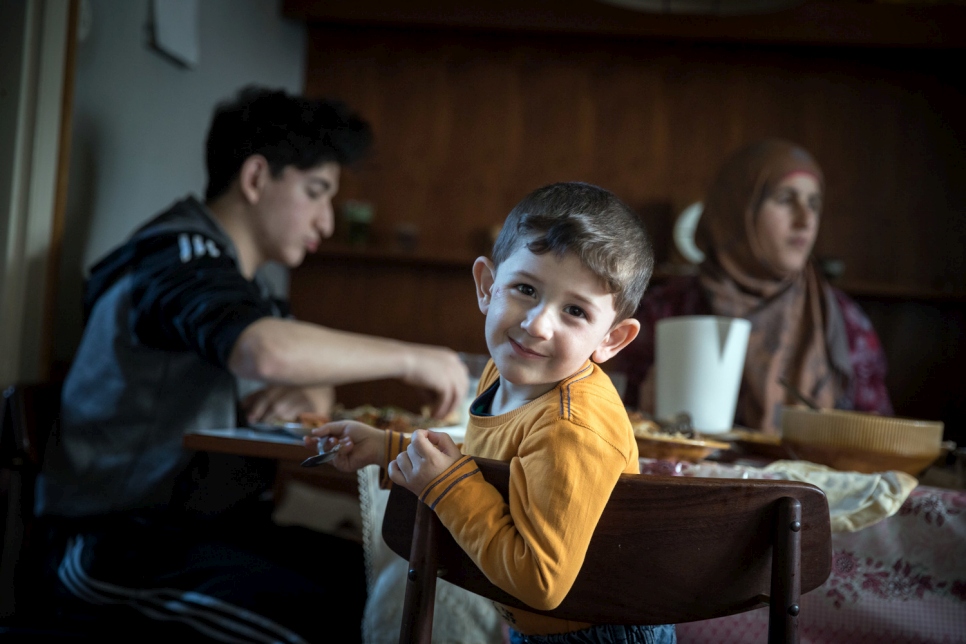Working with European institutions
The European Union (EU) plays an important role in designing the asylum legislation and policies of its Member States.
UNHCR engages with EU institutions – including the Council of the European Union, the European Commission, the European Parliament and the European Court of Justice – to ensure that EU laws and policies are in accordance with the 1951 Refugee Convention and its 1967 Protocol.
We collaborate on daily basis with EU institutions and agencies through our office in Brussels as well as liaison offices in Malta and Poland, which deal respectively with the European Asylum Support Office and Frontex, the EU’s external border agency. UNHCR cooperates with the European Union Agency for Fundamental Rights, based in Vienna, including through expert consultations, conferences and seminars as well as data and information exchange.
The European Commission supports UNHCR’s work globally with earmarked contributions – mainly for humanitarian assistance. The EU is also a strategic partner for advancing key policies.
UNHCR’s recommendations to the Presidency of the Council of the European Union
The Member State holding the Presidency of the Council of the European Union has a key role in advancing the EU’s agenda on asylum and migration. As part of our engagement with the Council of the European Union to ensure that EU laws and policies are in accordance with the 1951 Refugee Convention and its 1967 Protocol, we issue recommendations to each incoming Presidency ahead of its tenure. The recommendations provide an overview of our most recent policy suggestions on EU matters.
- UNHCR's recommendations for the Romanian Presidency of the Council of the EU (December 2018)
- UNHCR’s Recommendations to the Federal Republic of Austria for its Presidency of the Council of the European Union (EU) July-December 2018 (June 2018)
- UNHCR’s recommendations to the Republic of Bulgaria for its Presidency of the Council of the European Union (EU) A time for solidarity January – June 2018 (December 2017)
- Recommendations to Malta and Estonia for the Presidency of the Council of the European Union (December 2016)
- Recommendations to the Slovak Republic for its Presidency of the Council of the EU July – December 2016 (July 2016)
- Updated Recommendations to The Netherlands for its Presidency of the Council of the EU January – June 2016 (January 2016)
UNHCR comments and proposals to the European Union institutions and agencies
- Better Protecting Refugees in the EU and Globally: UNHCR's proposals to rebuild trust through better management, partnership and solidarity
- UNHCR comments on the Commission proposal for a Regulation of the European Parliament and of the Council on the European Border and Coast Guard and repealing Regulation (EC) No 2007/2004, Regulation (EC) No 863/2007 and Council Decision 2005/267/EC
- UNHCR comments on the European Commission proposal for a Regulation of the European Parliament and of the Council on the European Union Agency for Asylum – COM (2016) 271
- Proposal for a Regulation of the European Parliament and of the Council establishing a Union Resettlement Framework and amending Regulation (EU) No 516/2014 of the European Parliament and the Council UNHCR's Observations and Recommendations
- UNHCR comments on the European Commission proposal for a Regulation of the European Parliament and of the Council establishing the criteria and mechanisms for determining the member state responsible for examining an application for international protection lodged in one of the Member States by a third-country national or a stateless person (recast) – COM (2016) 270
- UNHCR Comments on the Proposal for a Directive of the European Parliament and of the Council laying down standards for the reception of applicants for international protection (recast) – COM (2016) 465
- UNHCR Comments on the European Commission Proposal for a Regulation of the European Parliament and of the Council on the establishment of 'Eurodac' for the comparison of fingerprints for the effective application of [Regulation (EU) No 604/2013 - COM (2016) 272
- UNHCR Recommendations to the European Union - EU Multiannual Financial Framework 2021-2027: Addressing forced displacement effectively
Working with the Council of Europe
UNHCR works with the Council of Europe to ensure that the standard-setting instruments and human rights monitoring mechanisms of the Council of Europe continue to address the needs of refugees and other persons of concern to UNHCR.
Our Representation to the European Institutions in Strasbourg provides asylum and international refugee law expertise and information on situations in countries of origin to the various organs and entities of the Council of Europe, including the European Court of Human Rights (ECtHR), the Department for the Execution of ECtHR Judgments, the Parliamentary Assembly, the Secretariat of the Committee of Ministers, the Council of Europe Commissioner for Human Rights, the European Committee of Social Rights, as well as the Council of Europe’s monitoring bodies such as the European Committee for the Prevention of Torture and Inhuman or Degrading Treatment or Punishment (CPT), the European Commission against Racism and Intolerance (ECRI), the Group of Experts on Action against Violence against Women and Domestic Violence (GREVIO) and the Group of Experts on Action against Trafficking in Human Beings (GRETA).
Working with the Organization for Security and Cooperation in Europe (OSCE)
Conflict management and addressing displacement is linked to the mandates of both the OSCE and UNHCR, and the two organizations are cooperating on a wide range of conceptual and operational issues. The number of persons of concern to UNHCR within the OSCE area is on a steady rise, which underlines the need for close cooperation.
UNHCR's Liaison Office in Vienna represents UNHCR to the OSCE, liaising with the 57 OSCE participating States, its 11 Partners for Co-operation, OSCE Executive Structures and Institutions such as the Secretariat, the Conflict Prevention Center, the Transnational Threats Department/Border Security and Management Unit, Special Representative/Coordinator for Combatting Trafficking in Human Beings, the Office for Democratic Institutions and Human Rights, the High Commissioner on National Minorities, and the OSCE Special Monitoring Mission to Ukraine.
This collaboration has resulted in joint OSCE-UNHCR multiphase projects such as:

